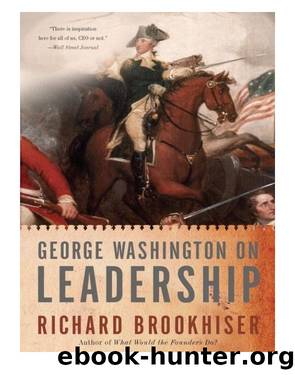George Washington On Leadership by Richard Brookhiser

Author:Richard Brookhiser
Language: eng
Format: epub
Publisher: Basic Books
Published: 2010-12-01T00:00:00+00:00
CHAPTER 12
ENEMIES
ENEMIES HAVE to be beatenâkilled or impoverished in war, defeated in politics, outsold in business. Everyone understands this, from the earliest childhood game with winners and losers. But as we grow older, we learn there are other things we have to do with enemies, during and after the contest.
LIVING WITH ENEMIES
Washington played to win. He went to the Constitutional Convention only when he was sure that most of the delegates were as serious about change as he was; once the Constitution was written, he did everything in his power to ensure that his state ratified it. âBe assured,â wrote James Monroe, a Virginian who opposed the Constitution, âhis influence carried this government.â
When, as a private citizen, assigned to survey land claims for French and Indian War veterans, he was accused of shortchanging a fellow veteran (and benefiting himself), he reacted with wrath, telling the complainant in a letter that he was impertinent, drunk, rude, stupid, and sottish. He stepped so far outside the bounds of normal discourse between gentlemen because his honesty and honor had been questioned: that demanded a nuclear response. In real war, he could show a stern face, hanging Benedict Arnoldâs spymaster.
He went to great lengths to secure specific goals, or to respond to particular offenses. Yet his behavior toward enemies was usually modified by his awareness of time. He looked beyond the moment he was in to the time that was to come. Some enemies would survive the struggle; perhaps the struggle was over, and they had already survived it. They might be fellow citizens; even if they lived on different continents, they would still be sharing the same world. That thought influenced how he treated them as he was beating them.
The Revolution had some of the characteristics of civil war, and the internecine strife of city-states. As rival armies came and went, many ordinary people sat on the sidelines, while others, more zealous in the cause, recommended harsh measures for timeservers. When the British left Philadelphia in 1778, after an exceedingly pleasant occupation, Gouverneur Morris suggested that the city be fined for collaborating. At their worst, grudges morphed into vendettas. In 1780 Nathanael Greene reported that patriot and loyalist guerrillas in the Deep South âpursue[d] each otherâ like âbeasts of prey.â After the war, survivors longed to settle accounts; New York, which had suffered a long occupation, encouraged patriots to sue loyalists for doing business under British rule. Washington set his face against reprisals, monetary or violent. Morrisâs plan to punish Philadelphia, he wrote, âwidely differs from mine.â Like Greene, whom he had sent to run the southern theater, he wanted a war conducted by disciplined troops, not partisans settling scores. When New Yorkâs courts interpreted the stateâs punitive laws in a humane spirit, Washington, observing from out of state, gave his âhearty assent.â
Washington dealt coolly with enemy nations. Many of his colleagues, including three future presidentsâThomas Jefferson, James Madison, and James Monroeâwere frozen by the Revolutionary War, becoming diehard Anglophobes and Francophiles, especially after Franceâs revolution made her a sister republic.
Download
This site does not store any files on its server. We only index and link to content provided by other sites. Please contact the content providers to delete copyright contents if any and email us, we'll remove relevant links or contents immediately.
Einstein: His Life and Universe by Walter Isaacson(1353)
Finding Freedom: Harry and Meghan and the Making of a Modern Royal Family by Omid Scobie & Carolyn Durand(1196)
Promised Land (9781524763183) by Obama Barack(1169)
Compromised by Peter Strzok(1084)
Finding Freedom by Omid Scobie(1077)
JFK by Fredrik Logevall(1015)
Freedom by Sebastian Junger(661)
Salford Lads: The Rise and Fall of Paul Massey by Bernard O'Mahoney(601)
The Russia House by John Le Carré(586)
Kremlin Winter by Robert Service(547)
Day of the Dead by Mark Roberts(533)
Graveyard (Ed & Lorraine Warren Book 1) by Ed Warren & Lorraine Warren & Robert David Chase(524)
A World Ablaze by Craig Harline(521)
Flying Tiger by Samson Jack(520)
Joe Biden: American Dreamer by Evan Osnos(507)
The Irish Buddhist by Alicia Turner(494)
100 Things Successful Leaders Do by Nigel Cumberland(489)
Melania and Me: The Rise and Fall of My Friendship With the First Lady by Stephanie Winston Wolkoff(488)
The Mission by David W. Brown(473)
